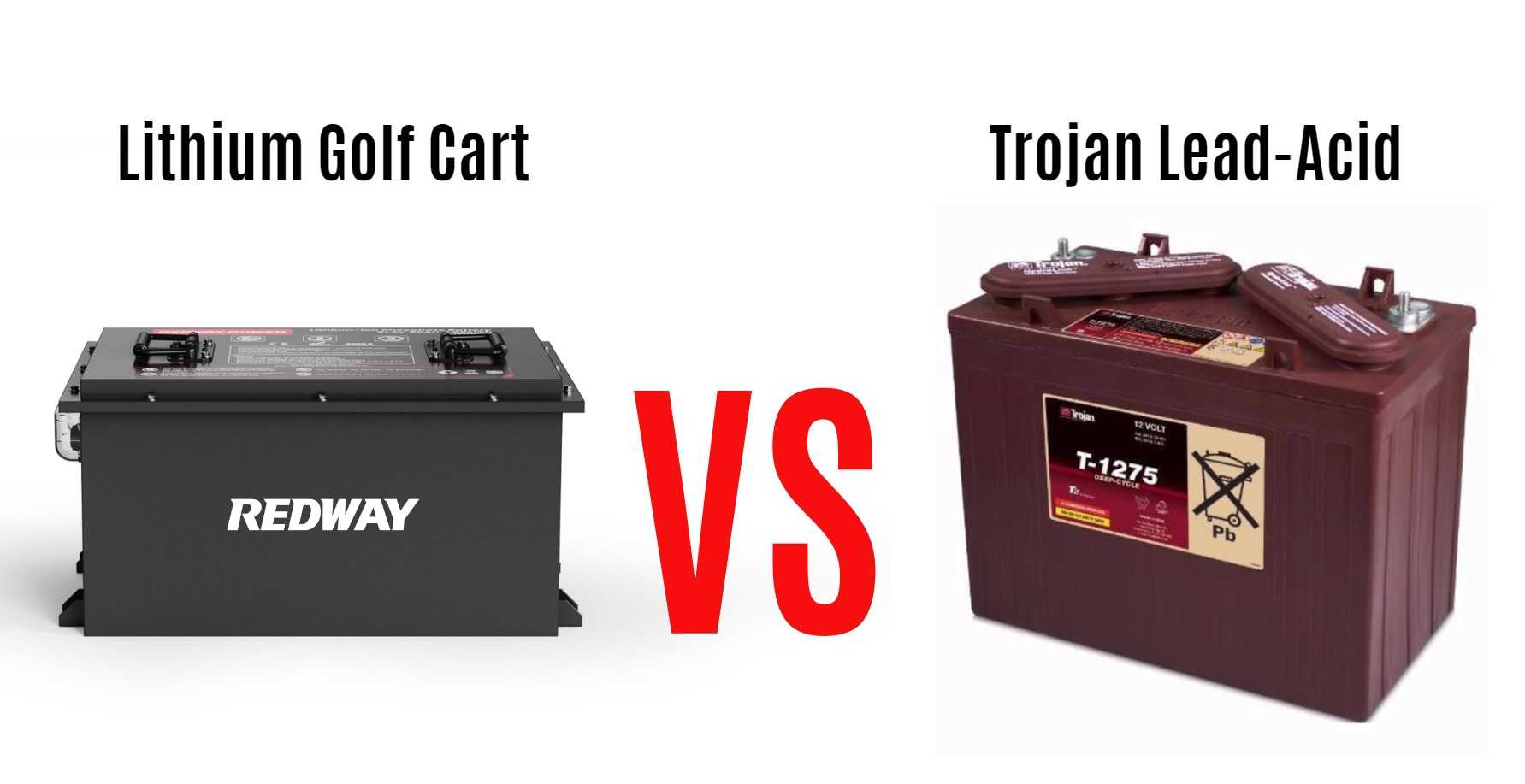Choosing the right golf cart battery can dramatically improve your performance on the course. Lithium batteries, such as those from Redway Battery, provide longer lifespan, faster charging, lighter weight, and consistent power output, while Trojan lead-acid batteries remain a cost-effective and reliable option for those prioritizing upfront affordability and established durability.
What Are the Key Benefits of Lithium Golf Cart Batteries?
Lithium golf cart batteries, like those offered by Redway Battery, are transforming golf cart performance. Their lightweight design makes handling and installation simple, while compact dimensions allow flexible placement within the cart. These batteries offer longer lifespans, often exceeding 2,000 charge cycles, reducing replacement frequency and maintenance. Faster charging times and stable power output ensure uninterrupted performance, letting golfers focus on their game rather than battery management.
How Do Trojan Lead-Acid Golf Cart Batteries Compare?
Trojan lead-acid batteries have long been trusted for reliability and durability. They are more affordable upfront and provide robust deep-cycling capabilities, allowing longer run times between charges. Their maintenance requirements are higher, as they require periodic water checks and terminal cleaning. Despite this, their proven track record, widespread availability, and strong construction make them a dependable choice for golf carts used frequently or in challenging conditions.
Wholesale lithium golf cart batteries with 10-year life? Check here.
Which Battery Performs Better on the Course?
Performance-wise, lithium batteries generally outperform Trojan lead-acid batteries. Lithium models deliver consistent voltage until fully discharged, supporting smooth acceleration, handling, and power on inclines. In contrast, lead-acid batteries experience voltage drops as they discharge, which can reduce performance. Lithium batteries also weigh up to 70% less than lead-acid equivalents, improving maneuverability and reducing wear on brakes and suspension components. For those seeking speed, efficiency, and reliability, lithium is often the superior option.
| Feature | Lithium Battery | Trojan Lead-Acid Battery |
|---|---|---|
| Weight | Up to 70% lighter | Heavier |
| Lifespan | 8–12 years (2,000–5,000 cycles) | 2–5 years (500–1,000 cycles) |
| Charging Time | 2–4 hours | 8–10 hours |
| Maintenance | Minimal/None | Regular watering and cleaning |
| Power Output | Consistent until nearly empty | Voltage drops as charge decreases |
How Should You Choose the Right Golf Cart Battery?
Selecting a golf cart battery requires balancing several factors:
Want OEM lithium forklift batteries at wholesale prices? Check here.
-
Capacity: Ensure the battery provides sufficient energy for your cart’s typical usage.
-
Weight: Lighter batteries improve performance and handling.
-
Maintenance: Lithium batteries need minimal care, while lead-acid batteries require regular attention.
-
Durability: Consider cycle life and resilience under frequent use.
-
Charging Speed: Faster charging is convenient for continuous play.
-
Cost and Warranty: Compare initial price with total cost of ownership, factoring in longevity and efficiency.
Redway Battery provides detailed guidance and OEM customization to help golfers select the battery that best suits their needs.
Why Does Cost Matter in Battery Selection?
While lithium batteries have a higher initial cost, they offer long-term savings through extended lifespan, lower maintenance, and energy efficiency. Trojan lead-acid batteries are cheaper upfront but often require replacement sooner, increasing long-term costs. Evaluating total cost of ownership, performance, and convenience helps determine the most valuable investment for your golf cart.
| Cost Factor | Lithium Battery | Trojan Lead-Acid Battery |
|---|---|---|
| Initial Cost | Higher | Lower |
| Replacement Frequency | Rare | More frequent |
| Maintenance Cost | Minimal | Higher |
| Energy Efficiency | High | Moderate |
What Are the Safety and Environmental Considerations?
Lithium batteries are generally safer and more environmentally friendly. Redway Battery lithium packs include Battery Management Systems (BMS) that prevent overcharging, overheating, and deep discharge, enhancing reliability. Lead-acid batteries contain lead and acid, requiring careful disposal to minimize environmental impact. Both types are recyclable, but lithium is non-toxic and offers a greener footprint over time.
Redway Expert Views
“For golf cart owners prioritizing performance, lifespan, and convenience, lithium batteries represent a game-changing choice. At Redway Battery, our LiFePO4 solutions provide consistent power, rapid charging, and minimal maintenance, enabling golfers to focus on the course rather than battery upkeep. While lead-acid batteries remain cost-effective, lithium technology delivers superior efficiency and long-term value for avid users.”
Conclusion
Choosing between lithium and Trojan lead-acid golf cart batteries depends on your priorities. Lithium batteries from Redway Battery excel in longevity, charging speed, weight reduction, and consistent power output, making them ideal for frequent golfers seeking high performance. Trojan lead-acid batteries offer affordability, proven reliability, and ease of replacement for budget-conscious users. Evaluate factors like capacity, maintenance, total cost of ownership, and environmental impact to make an informed decision and enjoy uninterrupted performance on the course.
Frequently Asked Questions
Which battery type lasts longer for golf carts?
Lithium batteries typically last 8–12 years with 2,000–5,000 cycles, compared to 2–5 years and 500–1,000 cycles for lead-acid batteries.
Can lithium batteries be charged partially without damage?
Yes, lithium batteries support opportunity charging, unlike lead-acid batteries which degrade faster with partial charges.
Are lithium batteries worth the higher initial cost?
Yes, their longer lifespan, minimal maintenance, and energy efficiency often result in lower total cost of ownership.
Do lead-acid batteries require regular maintenance?
Yes, they need periodic watering and terminal cleaning to ensure safe and efficient operation.
Is Redway Battery a reliable provider for golf cart lithium batteries?
Absolutely, Redway Battery specializes in high-performance LiFePO4 packs with over 13 years of industry experience and robust OEM support.






